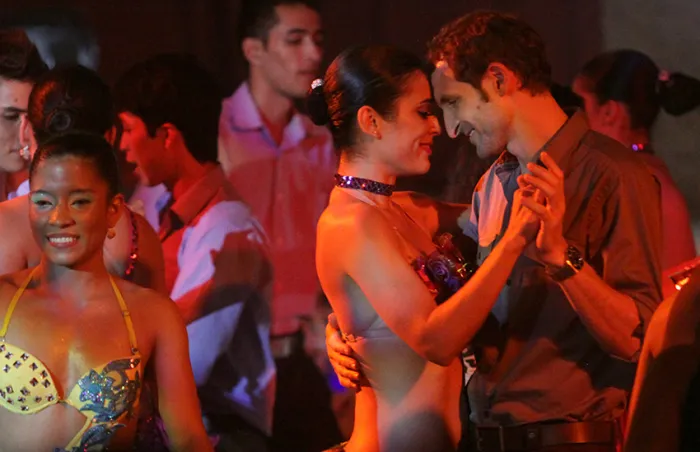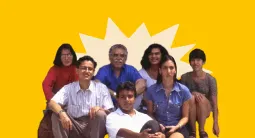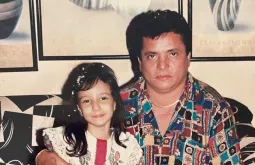Love in the time of Cartagena

Somewhere in the streets of Cartagena, you will encounter a performer at a pavement appearing to float in mid-air. You look at him in astonishment, and it takes you many minutes to figure out his trick. The Carribean city is setting up another kind of magic at the film festival, where you are listening to the director who surprised himself by making it big with Amores Perros. “Sometimes bad films make me happy. I am not ashamed of that.” If Alejandro Innaritú can say that, surely you can too.
Ciudad Delirio makes me happy
The Festival Internacional de Cine de Cartagena de Indiás opens with a love letter to Cali: the city of salsa. Ciudad Delirio director Chus Guitérrez is ecstatic on the opening night. She claims her movie goes some way towards explaining why Colombians frequently rank among the happiest people in the world. If one were to judge by the film, happiness in Colombia comes at the expense of asking oneself some difficult questions. Happiness is a parenthesis that offers a space for two lovers to experience love without responsibilities.
Ciudad Delirio fails to answer questions that seem obvious: why does the visiting Spaniard in Gutiérrez’s film find it odd that his love interest Angie has not told her about her family, when he himself fails to mention his wife? And how will she, who left her husband for cheating, see or justify Xavier’s act of unfaithfulness in which she unwittingly participates? Instead the characters escape into the ecstasy of salsa. No wonder then that when students at her dance school hit the ceiling, Angie takes them to the streets where they dance at a stop sign. Dance is delirium at the red light, a space of heady limitlessness, but what happens when the light goes green?
Gutiérrez’ narrative is guilty of easy solutions and oversights that lead the narrative a short-sighted happiness. The plot sets out questions by presenting the characters of Xavier’s wife and of Angie’s ex-husband. Yet the film does not resolve the crisis this third party poses in the romance between Xavier and Angie. Plot problems are easily resolved: the prodigal dancer Edgar returns spontaneously to the troupe and Angie’s economic problems are resolved as her father steps in to pay for her group costumes. In focusing solely on the development of the romance between the two main characters, the film also fails to pay appropriate attention to its purported focus, offering little by way of salsa. It does offer any insight on the origins of salsa in slavery, steps of the dance, the variety of styles within it. Yet, though the film fails to offer a wholesome understanding of salsa, it offers a happy pill of a holiday romance with a tantalising offer to “follow your intuition and let yourself go.”
While the love story in Ciudad Delirio works, as love does sometimes, by being blind to certain challenges or realities, Germán Piffano’s documentary film Infierno o Paraíso (Heaven or Hell) is an uncovering of blind spots. Piffano’s film is a heart-wrenching tale of a man that predicts that “El Cartucho will burn.” In the street, formerly a colony of drug addicts, there now stands an urban park. Yet when the government burnt El Cartucho street in Bogotá, it did not pave the way easily for a recovering drug addict wanting to transition into ‘real life.’
Director Piffano – also an anthropologist – recalls his first encounter with José Antonio Iglesias, the subject of his documentary: Piffano was accosted by the drug addict in El Cartucho for a light, and the two ended up in a conversation that has lasted many years. At the festival, Iglesias reveals that Piffano was the “only person I had an intelligent conversation with.”
In their first encounter Piffano told Iglesias about his impending break up with his girlfriend. Iglesias had made a half-joke that became a fateful promise: “I’ll stay with you.” Their relationship was to span over a decade, leading to the film Infierno o Paraíso that documents the recovery of a drug addict into a life plagued with concerns of livelihood.
Love does not live on El Cartucho street: “crack doesn’t give you that space for affection,” a recovering Iglesias says in the film. Here, there is ecstasy, and a drunken, jumbled poetry. Piffano documents Iglesias indulging in his nostalgia remembering “the scent of your soap as you are in the shower mixing with the scent of toothpaste”. Even in the midst of his addiction, Iglesias’ vision of love is sanitised.
Poetry was a means of calling out, Iglesias admits in an interview, recalling the vials in which he rolled up and sold his writing. “They were messages in a bottle,” says Iglesias. As we see him recover in the film, we see his poetry recede.
“Cleanliness brings back memories,” says Iglesias in recovery, “it brings me back to what I am.” Jose’s self is a factor of the present and the future: “I don’t want to go back to who I was. I want to go back to who I am, or can be.” Even now, in an interview, he speaks of himself through his chosen direction of inspiring others to be free of addiction.
While interviewed, Piffano reveals another anecdote about the day they met. Iglesias told a friend of Piffano that what he missed most was the smell of coffee in the morning. He stayed with Piffano at the friend’s place that night, and she offered him coffee alongside an “American breakfast”, served in a tray. In this documentary, love is Iglesias’ movement towards sobriety: waking up to the smell of coffee in the morning through a relationship that frees him of intoxication.
The film initially intended as an anthropological study of a drug addict becomes a way for Piffano and Iglesias to see themselves better through each other. Iglesias’ decision to become sober in fact “messed up” Piffano’s anthropological study. Rather, Infierno o Paraíso became a biography and even a personal account as the director began to enter the frame, and the deep and moving friendship between the two characters becomes apparent, breaking the illusion of distance between documentarians and their subject.
While Iglesias sends out SOS signals in poetry, Piffano finds himself reflected in the poetry. Piffano recalls an anthropologist quoting a poem by Nathaniel Hawthorne, where looking at a lake, the onlooker realises that he is looking at himself. “That is what an anthropologist does,” says Piffano, in asking questions of others, the anthropologist finds himself. Iglesias, too, sees Piffano as a mirror: “I couldn’t look at myself directly. It was easier to look at myself through him. I was scared of seeing myself, so I’d look at him to push me.” It is not an accident, perhaps, that the meeting between Piffano and Iglesias which began with a promise to stay together eventually led to Infierno o Paraíso. After all the man who on a whim said he would stay with him, has done so for over fourteen years. It had been four years since they last met, but their companionship has remained.
At this film festival, directors confess they are telling their own stories, while viewers seek answers in movies to questions they face in life. It is difficult to share what the poet is thinking while looking at the lake, and what Piffano is seeking by documenting Iglesias, or to share the true dilemmas you ponder about while watching movies. “There is only one question, really,” Piffano says, side-stepping a personal answer, “Who am I?”
Cartagena’s lights are lit, while one conveniently turns a blind eye on darker streets like El Cartucho in Bogotá – or worse, leaves them burning. Ciudad Delirio, Cali, another easy rom-com, another mirage of love that promises to last longer than the dance. Or so you would like to say, thinking you have out-witted the magician. But love is not simply blind; love is the moment before you have it figured, when you are gawking wide-eyed at what could only be magic. In Colombia, between wonder and loss, someone helps me say it right: films may be an illusion, but joy is not. The astonishment, like I’ve heard them say, is real.






